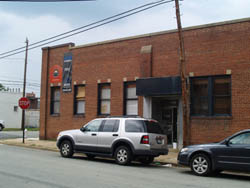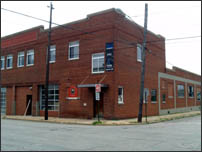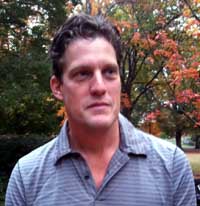 A bank owed millions by Justin French is going after one of his former business partners, who happens to be an aspiring city councilman.
A bank owed millions by Justin French is going after one of his former business partners, who happens to be an aspiring city councilman.
Bank of Hampton Roads on Tuesday sued David Gammino, alleging that he and his company City & Guilds had a hand in defrauding the bank of more than $13 million on two of French’s construction projects in Scott’s Addition.
The bank claims that Gammino, City & Guilds, and French signed off on certified claims for millions of dollars in cash construction draws for work that hadn’t been done.
The suit, filed Tuesday in Richmond Circuit Court, claims two counts of fraud and conspiracy and seeks $14 million in total damages.
Gammino, who said he hasn’t seen the suit, said that his crew performed the work he was paid for and that, like the bank, he is owed money by French.
The projects in question are at 3031 Norfolk Ave. (pictured bottom left) and 1700 Summit Ave., two properties French sought to convert into apartments with the help of historic tax credits.
Rick Matthews, an attorney with Pender and Coward in Virginia Beach who is representing Bank of Hampton Roads, said it took time to gather evidence against Gammino and his company, which at one point was partially owned by French.
“We have good evidence to support the allegations made,” Matthews said. “We feel like we have a good case to try.”
The case comes almost two years after work was last done on the sites and more than a year since French was sentenced to 16 years in federal prison in West Virginia for running a massive tax credit scam.
The certifications approving the cash draws were “erroneous, incorrect, inaccurate, false, fraudulent and/or overstated inasmuch as neither of the projects were anywhere near that level of completion,” the suit claims.
French borrowed $19.26 million on the two projects in 2007, $14.86 million of which was to be drawn on monthly and paid to the contractor. He was to sell the tax credits to Markel Corp., the Richmond insurer that invested in some of his projects.
French, Gammino and local architect Todd Dykshorn each certified to the bank that work was being completed on schedule, the suit claims. Dykshorn, a local architect whose firm Architecture Design Office designed the properties for French, was hired by the bank to verify and sign off on construction progress.Sixty-nine draws were made on the two projects between December 2007 and April 2010 to the tune of $14.67 million, according to the suit.
Dykshorn was sued by Bank of Hampton Roads on two counts of wrongful conduct for allegedly misrepresenting the progress of the rehabilitations. That case is pending in Richmond Circuit Court. Dykshorn did not return a call seeking comment.
Gammino, according to the suit, signed off as contractor on expense certifications only through December 2009. “Thereafter, all of the remaining draws were certified by French as the contractor,” the suit states.
But by that point, the bank says, it had already paid out $12.5 million
It wasn’t until June 2010 that the bank, concerned about progress at the sites, started digging.

According to the suit, French admitted to the bank that the draws taken on Summit and Norfolk had been commingled with his other projects.
The bank calls the commingling a “kiting,” or a Ponzi scheme, and claims that Gammino and his company had knowledge of what French was doing.
Efforts to conceal the true state of construction were so intentional, the suit claims, that workers on various French projects were dispatched to Summit and Norfolk when bank representatives were on their way to inspect.
Invoices for cash draws were submitted for allegedly nonexistent work, such as HVAC work when construction wasn’t close to the point of HVAC installation.
When reached by phone Wednesday, Gammino said he’s not entirely surprised by the suit. Gammino is running for City Council in the Fifth District against Martin Jewell.
 “When banks lose a ton of money, they’re going to look for recourse, and I probably am one of the last men standing with respect to the French debacle,” said Gammino, who has several local historic rehab projects under construction.
“When banks lose a ton of money, they’re going to look for recourse, and I probably am one of the last men standing with respect to the French debacle,” said Gammino, who has several local historic rehab projects under construction.
He defended his company’s track record and the work he signed off on at Summit and Norfolk.
“City & Guilds has been in business for seven years. We have never been sued before,” Gammino said. “We have tremendous banking relationships and have never had any problems on projects or loans with any banks.”
Gammino said his company received approximately $3 million to $4 million from French for work on the two sites.
The money from the construction draws went directly from the bank to French, who then paid others.
“All those funds the bank is talking about, the only money we received was money for work we did on those buildings,” Gammino said. “The money went to French. He paid us for the invoices we submitted. He never paid us more.”
Gammino said he and City & Guilds worked on almost 30 French projects between 2007 and 2009. Gammino said his former business partner owes him several hundred thousand dollars.
“I’m standing in a long line of individuals and companies and banks who Justin defrauded,” Gammino said. “I’m standing right there in that line with the Markels and all the banks.”
Gammino will be represented in the case by Cullen Seltzer from the firm Sands Anderson.
Bank of Hampton Roads isn’t the only bank left high and dry on the Summit and Norfolk projects.
The bank sold off pieces of the loan to two other banks through participation loans. That’s common practice among community banks on larger commercial construction projects because it helps them share the risk and stay within their lending limits.
Essex Bank and Lynchburg-based Select Bank sued Bank of Hampton Roads in December 2010 for $11 million claiming that the bank failed in its duties as lead lender by allowing the alleged fraud to take place. That suit is set for trial in September.
Bank of Hampton Roads has tried several options to deal with the Summit and Norfolk projects.
The bank wanted to avoid foreclosure, as that would have wiped out the chance to get tax credits on the projects. At one point, the bank considering paying for the build-out itself, and it hired a receiver to try to finish construction.
It also hired local contractor KBS to assess how much it would cost the bank to complete the build-out on its own. The sum: $9 million to finish both jobs.
In the end, Bank of Hampton Roads decided to throw in the towel and will foreclose on the two buildings in July, Matthews said.
 A bank owed millions by Justin French is going after one of his former business partners, who happens to be an aspiring city councilman.
A bank owed millions by Justin French is going after one of his former business partners, who happens to be an aspiring city councilman.
Bank of Hampton Roads on Tuesday sued David Gammino, alleging that he and his company City & Guilds had a hand in defrauding the bank of more than $13 million on two of French’s construction projects in Scott’s Addition.
The bank claims that Gammino, City & Guilds, and French signed off on certified claims for millions of dollars in cash construction draws for work that hadn’t been done.
The suit, filed Tuesday in Richmond Circuit Court, claims two counts of fraud and conspiracy and seeks $14 million in total damages.
Gammino, who said he hasn’t seen the suit, said that his crew performed the work he was paid for and that, like the bank, he is owed money by French.
The projects in question are at 3031 Norfolk Ave. (pictured bottom left) and 1700 Summit Ave., two properties French sought to convert into apartments with the help of historic tax credits.
Rick Matthews, an attorney with Pender and Coward in Virginia Beach who is representing Bank of Hampton Roads, said it took time to gather evidence against Gammino and his company, which at one point was partially owned by French.
“We have good evidence to support the allegations made,” Matthews said. “We feel like we have a good case to try.”
The case comes almost two years after work was last done on the sites and more than a year since French was sentenced to 16 years in federal prison in West Virginia for running a massive tax credit scam.
The certifications approving the cash draws were “erroneous, incorrect, inaccurate, false, fraudulent and/or overstated inasmuch as neither of the projects were anywhere near that level of completion,” the suit claims.
French borrowed $19.26 million on the two projects in 2007, $14.86 million of which was to be drawn on monthly and paid to the contractor. He was to sell the tax credits to Markel Corp., the Richmond insurer that invested in some of his projects.
French, Gammino and local architect Todd Dykshorn each certified to the bank that work was being completed on schedule, the suit claims. Dykshorn, a local architect whose firm Architecture Design Office designed the properties for French, was hired by the bank to verify and sign off on construction progress.Sixty-nine draws were made on the two projects between December 2007 and April 2010 to the tune of $14.67 million, according to the suit.
Dykshorn was sued by Bank of Hampton Roads on two counts of wrongful conduct for allegedly misrepresenting the progress of the rehabilitations. That case is pending in Richmond Circuit Court. Dykshorn did not return a call seeking comment.
Gammino, according to the suit, signed off as contractor on expense certifications only through December 2009. “Thereafter, all of the remaining draws were certified by French as the contractor,” the suit states.
But by that point, the bank says, it had already paid out $12.5 million
It wasn’t until June 2010 that the bank, concerned about progress at the sites, started digging.

According to the suit, French admitted to the bank that the draws taken on Summit and Norfolk had been commingled with his other projects.
The bank calls the commingling a “kiting,” or a Ponzi scheme, and claims that Gammino and his company had knowledge of what French was doing.
Efforts to conceal the true state of construction were so intentional, the suit claims, that workers on various French projects were dispatched to Summit and Norfolk when bank representatives were on their way to inspect.
Invoices for cash draws were submitted for allegedly nonexistent work, such as HVAC work when construction wasn’t close to the point of HVAC installation.
When reached by phone Wednesday, Gammino said he’s not entirely surprised by the suit. Gammino is running for City Council in the Fifth District against Martin Jewell.
 “When banks lose a ton of money, they’re going to look for recourse, and I probably am one of the last men standing with respect to the French debacle,” said Gammino, who has several local historic rehab projects under construction.
“When banks lose a ton of money, they’re going to look for recourse, and I probably am one of the last men standing with respect to the French debacle,” said Gammino, who has several local historic rehab projects under construction.
He defended his company’s track record and the work he signed off on at Summit and Norfolk.
“City & Guilds has been in business for seven years. We have never been sued before,” Gammino said. “We have tremendous banking relationships and have never had any problems on projects or loans with any banks.”
Gammino said his company received approximately $3 million to $4 million from French for work on the two sites.
The money from the construction draws went directly from the bank to French, who then paid others.
“All those funds the bank is talking about, the only money we received was money for work we did on those buildings,” Gammino said. “The money went to French. He paid us for the invoices we submitted. He never paid us more.”
Gammino said he and City & Guilds worked on almost 30 French projects between 2007 and 2009. Gammino said his former business partner owes him several hundred thousand dollars.
“I’m standing in a long line of individuals and companies and banks who Justin defrauded,” Gammino said. “I’m standing right there in that line with the Markels and all the banks.”
Gammino will be represented in the case by Cullen Seltzer from the firm Sands Anderson.
Bank of Hampton Roads isn’t the only bank left high and dry on the Summit and Norfolk projects.
The bank sold off pieces of the loan to two other banks through participation loans. That’s common practice among community banks on larger commercial construction projects because it helps them share the risk and stay within their lending limits.
Essex Bank and Lynchburg-based Select Bank sued Bank of Hampton Roads in December 2010 for $11 million claiming that the bank failed in its duties as lead lender by allowing the alleged fraud to take place. That suit is set for trial in September.
Bank of Hampton Roads has tried several options to deal with the Summit and Norfolk projects.
The bank wanted to avoid foreclosure, as that would have wiped out the chance to get tax credits on the projects. At one point, the bank considering paying for the build-out itself, and it hired a receiver to try to finish construction.
It also hired local contractor KBS to assess how much it would cost the bank to complete the build-out on its own. The sum: $9 million to finish both jobs.
In the end, Bank of Hampton Roads decided to throw in the towel and will foreclose on the two buildings in July, Matthews said.


